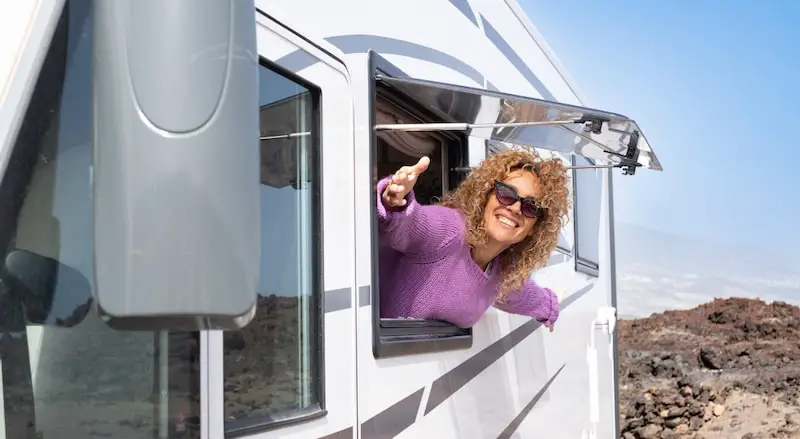When you own a recreational vehicle, it is important that you get it properly insured. Much like a home, there are many unexpected circumstances that can occur to cause damage. You want to make sure you have appropriate coverage in place in case this happens.
Since recreational vehicles need aspects of homeowners and auto insurance to be included in their coverage, full-time RV insurance tends to include a comprehensive list of coverages. Whether you plan on spending a lot of time on the road or will be mostly living in one place, it is essential to find the right policy for your RV.

- Full-time RV insurance is the most comprehensive type of insurance for an RV
- It provides coverage whether you are on the road or stopped
- There is liability coverage included with the policy in case you cause damage to another’s property

What is full-time RV insurance?
If you are using your RV as a permanent home, it is necessary to get a full-time RV policy. This will cover you in many instances that include time spent driving your RV and other situations where you are stopped. This is the equivalent of homeowners insurance for a home that is driveable and covers more than an auto insurance policy.
- When you have this coverage in place, it is possible for you to live in the RV or stay in it for long periods of time while you are on the road. This prevents you from needing to find accommodations in the form of hotels or rentals. Being covered while you are using your RV helps you feel more secure.
- The policy covers situations in which you are liable for causing damage. This can mean damage caused to personal property or injuries caused that you are responsible for. It also covers the RV in case you get into an accident or need to repair or replace the vehicle.
- You are likely going to have personal belongings in the RV that are susceptible to damage, and the policy will also cover these items. In case they are damaged, there is a standard coverage limit that will include all of the items you have inside the RV.
What is the difference between full-time and part-time RV insurance?
The main difference between full-time and part-time RV insurance is how you plan on using the RV. You will want full-time coverage if you plan on living in your RV or if you are going to take extended trips where you will be staying in the RV.
Those who choose to get part-time RV insurance typically only use their RV during certain months of the year or who seldom drive it. Both types of coverage are valid insurance policies, but full-time RV coverage is much more comprehensive.
- Part-time coverage is suitable if you only plan on taking your RV out during certain months or for vacation purposes. The trips are often a lot shorter and not regularly scheduled.
- Full-time coverage is recommended when you need extra protection because your RV is exposed to more risks. This happens when you drive it more frequently and take lengthy trips.
- There is a price difference between the two policies because one is seen as a recreational use policy while the other is seen as more of a homeowners insurance policy.

What is included in full-time RV insurance?
Understanding the coverage that is included with a full-time RV policy will help you determine what is going to be covered in the event that an incident occurs.
Bodily injury
Just like an auto insurance policy, this coverage protects you if you cause any bodily injury to another person in case of an accident. It is a coverage that is required in all states as long as the RV is driveable.
Property damage
This coverage protects you in case you cause any damage to another person’s vehicle during an accident. It also extends to cover their personal property that might become damaged. Like the previous coverage, it is only applicable to RVs that are drivable.
Uninsured motorist
In case you get into an accident with a driver that does not have insurance or drives off before you can exchange information, this coverage will protect you. It is an important coverage to have because hit-and-runs are common.
Collision
Regardless of who is at fault during the accident, you will have the coverage necessary to repair or replace your RV in case it gets damaged. This protects your vehicle.
Total loss replacement
This coverage is usually an additional coverage, but it applies when you must replace your RV in case it is totaled.
- If it is totaled within four years of being on the road, you will be provided with a new or comparable model.
- After being on the road for five to seven years, you will be given the actual cash value or cost of the original purchase price. This will be determined by which one is higher.
- Over seven years of being on the road, you will be given the cost of the actual cash value of the RV with depreciation determined in the pricing.
Personal effects replacement
This is the coverage that will pay for damages made to your personal belongings located inside the RV. The standard coverage limit is $5,000, but you can request an endorsement to receive up to $100,000 worth of coverage.
Comprehensive coverage
This coverage is designed to protect you from events that are outside of your control. It can cover damages caused by natural disasters, theft, and vandalism. It is another coverage similar to what you would find on an auto insurance policy that is included with full-time RV insurance.
Summary
Understanding how to protect your RV whether you are driving on the road or stopped at a destination is important. It is clear to see why full-time RV insurance is considered the most comprehensive policy for those who frequently drive and stay in their RVs. It provides protection from many instances that are outside of your control and also protects you in case you are at fault.

